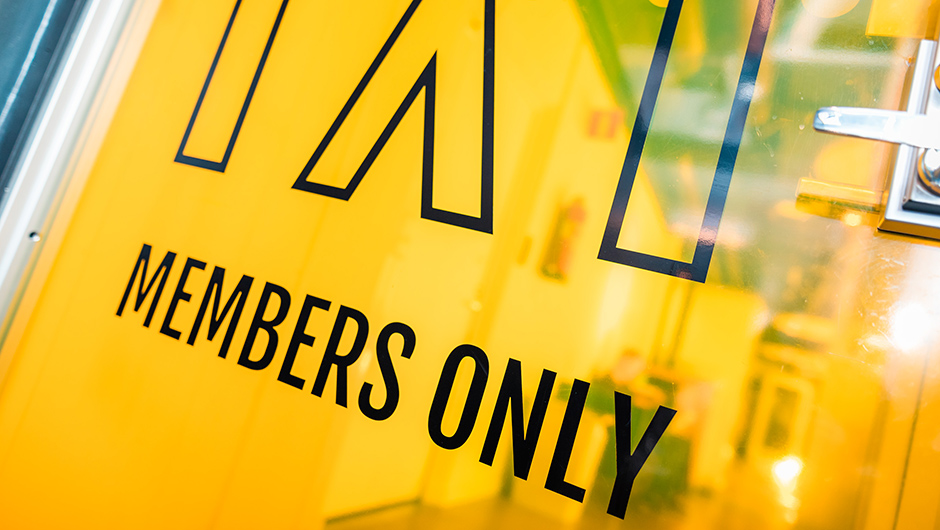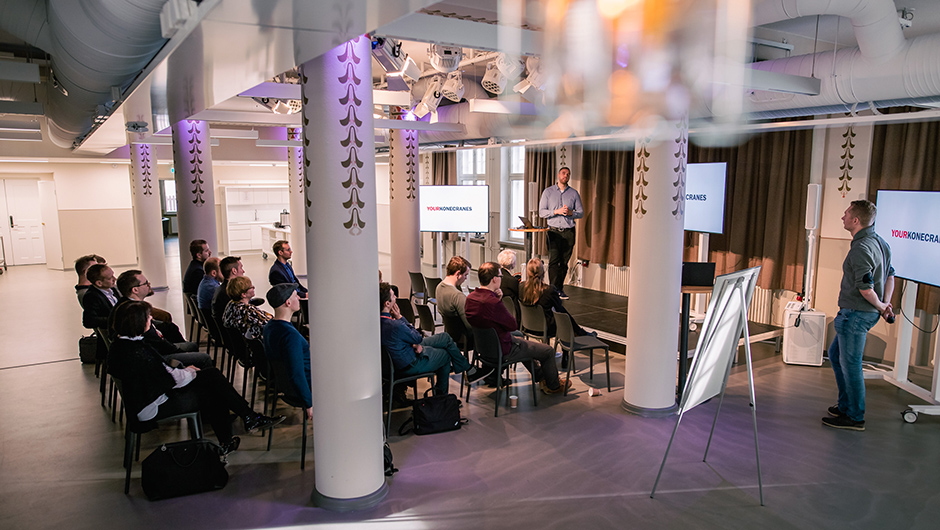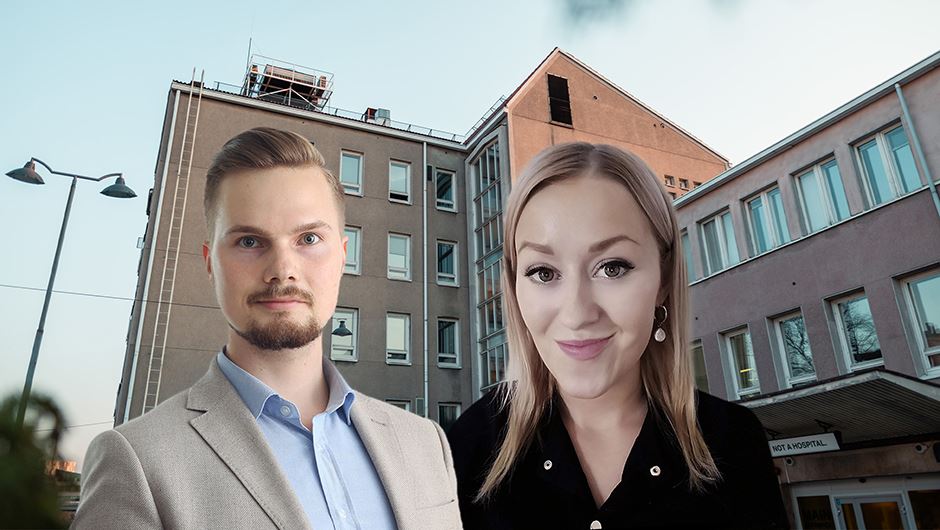Sustainable data centers as a service
These days, many large companies are interested in working with startups, but successful startup collaboration should not be motivated by getting in on the buzz. Konecranes, The Finnish corporation specializing in the manufacture and service of cranes and lifting equipment, sees working with growing companies as a win-win situation, where both parties truly benefit from one another. A larger ecosystem means space for more talent.
In a photo Jussi Eskelinen ja Katariina Palvas from Konecranes, Photos by Tapio Auvinen
At first, confusion. Why does Konecranes, a company with roots in the Finnish industry landscape since the 1930s and employing more than 18 thousand people all around the world, have a working space at Maria 01 startup campus? What does a corporation operating in more than fifty countries have to do with the startup community that has been up and running since 2017?
“Maria 01 has always had a brilliant vision, as it gathers all the most relevant players in the ecosystem together into the same community. At Maria 01 you can find the startups, the investors, and the corporations,” says Jussi Eskelinen, Startup Coordinator at the Konecranes Digital Accelerator.
Konecranes has been one of Maria 01’s Corporate Partners from the very beginning. For almost four years Maria 01 has been a platform for Konecranes to add more customer centricity and startup proximity to its corporate culture.
For Konecranes, being a partner at Maria 01 means scouting new startups that fit the corporation’s business needs and operating with them on a day-to-day level. At the same time, Konecranes also aims to improve its new digital business operations.
Working with startups is all about a fair business relationship, where Konecranes is a dependable early customer for growing companies. As a successful corporation, Konecranes provides feedback and support that can help startups develop their product for the needs of vaster audiences.
“We need to make sure that the collaboration is beneficial to our business, and that it runs smoothly for the startups, too. Having a strong end-to-end approach is very important to us,” Eskelinen says.
The goal of cooperating with startups is to help Konecranes develop its services and products for its customers, and also work together in possible commercial collaborations. With Konecranes as their customer, startups get valuable information on how to further develop their service or product.
Katariina Palvas, who is responsible for planning and executing Konecranes' startup collaboration on a daily level, believes the greatest benefits for corporations and startups collaborating come from colliding different mindsets and combining each others strengths.
“Large companies have their resources, a well-known brand, and their networks, whereas the startups’ agile operating models and mindset are something we can learn from,” Palvas says.
Konecranes is especially interested in working with startups within the tech scene, but in the future, there might also be an interest in companies within the circular economy.
Collaboration is always born out of necessity: there needs to be an issue or a question looking for a solution. A will to work with startups is not big enough a reason for collaborating.
Palvas acknowledges that working with startups is seen as something very desirable right now, but she highlights that a large company needs to be able to offer the startups fair terms for collaboration, and also the possibility for long-term business.
“We want the collaboration to be a win-win situation for both parties,” she points out.
For Konecranes, collaborating often is about building a vendor and customer relationship. The company starts a business relationship with startups that already have what it takes to serve an enterprise-level customer, and have a product or a service that is somewhat complete. Usually, this means companies that have raised either seed or Series A funding.
One great example of successful startup collaboration is the story of the Swedish troubleshooting automation company Mavenoid, Eskelinen says. The Konecranes’ REACH program scouted Mavenoid after it had raised angel funding, realizing their Software as a Service product was a perfect fit for Konecranes’ needs. This spring, Mavenoid raised Series A funding and has grown from a company of four to now building an organization of tens of people.
Eskelinen says Konecranes has received raving reviews from Mavenoid. As an early customer, Konecranes has been able to provide the startup with customer information that has helped Mavenoid quickly improve their product in a direction that is beneficial both to Konecranes and all its other customers.
“It’s a great story of how we have been a reference for Mavenoid’s investors. The company’s latest funding round was worth eight million dollars, which means that they are growing at an exponential speed,” Eskelinen says.
The everyday life in a startup is often a far cry from the buzz they are often associated with the public discussion. The Konecranes staff have a front-row seat witnessing how things get done since the corporation has reserved working seats in the Maria 01 co-working area.
Startups should actively participate in networking events outside the traditional working hours to get to know potential customers and collaborators, but when it is time for work, they do work.
“They have to work very hard. Growth companies have no other option but to become really good, otherwise, they’ll cease to exist”, says Eskelinen.
Having the possibility to work at Maria 01 in the proximity of startups gives a large company like Konecranes the opportunity to meet fresh talent while running their daily operations, in an atmosphere that is more relaxed than an official meeting.
As Palvas puts it, it’s essential for big companies to be where things happen.
“It is great to be a part of Finland’s sharpest startup selection as a member of the community. For sure, it is a lot more beneficial to be present at Maria 01 every week than not having that opportunity at all.”
The partnership with Maria 01 is about more than just a platform to scout new startups. Last year, together with the Maria 01 crew, Konecranes organized its first acceleration program for its internal staff.
The Internal Transformational Program collided Konecranes’ employees with Maria 01 community members, both entrepreneurs, and investors, through lectures and mentorship. Thanks to the good feedback received from the pilot, Eskelinen is sure that the accelerator program will be organized again.
Konecranes finds partnering up with Maria 01 beneficial for large corporations and their employees in several ways. Along with new business opportunities, experiencing different ways of working may also result in a broader horizon.
“The employees who participated in the acceleration program had very positive experiences. During the months of the program we noticed that for some it improved the approach they had on certain projects, that their thinking had become more agile,” Palvas says. Read more about the Konecranes startup program from here.
Right now, Maria 01 is growing rapidly. In cooperation with YIT, the startup community is expanding into Europe’s largest startup campus, with more room for growing companies, investors, and large companies.
Both Palvas and Eskelinen believe that the expanding Maria 01 campus will bring plenty of new benefits also for corporations the size of Konecranes.
As Eskelinen points out, even though we are currently living in a world of remote work, physical proximity with partnering companies has its perks. A larger campus means more space for startups and more space for corporations looking for startups to collaborate with.
“It is more likely to find those brilliant cases that Finland is already known for in an ecosystem that has an effectively competitive market. The way I see it, a larger ecosystem gives us better opportunities to find new and relevant startups that can complement our business. A growing campus also brings us more possibilities to improve our inner operations through acceleration programs, for example,” he says.
A larger campus also means wider internationalization opportunities, because one of its aims is to attract companies to Helsinki from all around the world. Konecranes operates in fifty different countries, and the corporation isn’t restricting its startup collaborations to Finnish or Nordic startups only.
“As the campus becomes even more international, it will also allow Konecranes to extend our international contacts. We are excited to see what kind of new opportunities the future campus holds for Konecranes,” Palvas concludes.
Maria´s area is developing into one of Europe´s largest startup campus. Follow the Maria´s area development journey with this series of stories. Stay tuned and subscribe to our newsletter!
